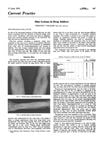 67 citations,
January 2022 in “Theranostics”
67 citations,
January 2022 in “Theranostics” Advanced nanocarrier and microneedle drug delivery methods are more effective, safer, and less invasive for treating skin diseases.
 67 citations,
September 2003 in “Journal of cutaneous pathology”
67 citations,
September 2003 in “Journal of cutaneous pathology” Skin problems are very common in people with end-stage kidney disease.
 66 citations,
July 2015 in “Journal of Molecular Biology”
66 citations,
July 2015 in “Journal of Molecular Biology” The document concludes that for hair and feather growth, it's better to target the environment around stem cells than the cells themselves.
 65 citations,
June 2003 in “EMBO journal”
65 citations,
June 2003 in “EMBO journal” Noggin overexpression delays eyelid opening by affecting cell death and skin cell development.
 58 citations,
January 2003 in “Thrombosis and Haemostasis”
58 citations,
January 2003 in “Thrombosis and Haemostasis” Testosterone may slow down wound healing and increase inflammation.
 56 citations,
June 1970 in “The BMJ”
56 citations,
June 1970 in “The BMJ” Drug addicts often have scars, skin color changes, blocked veins, and bruising, with severe ulcers from barbiturate injections.
 55 citations,
April 2010 in “Cancer and Metastasis Reviews”
55 citations,
April 2010 in “Cancer and Metastasis Reviews” TGFβ's manipulation of inflammation and immune cells affects cancer spread, suggesting new treatment strategies and biomarkers.
 50 citations,
March 2017 in “PeerJ”
50 citations,
March 2017 in “PeerJ” Using finasteride or dutasteride may cause long-lasting erectile dysfunction.
 48 citations,
January 2011 in “Circulation”
48 citations,
January 2011 in “Circulation” Cardiovascular disease deaths decreased but still caused one-third of U.S. deaths in 2007, with high rates of hypertension, smoking, obesity, and diabetes.
 46 citations,
January 2020 in “Theranostics”
46 citations,
January 2020 in “Theranostics” Injecting a special gel with human protein particles can help hair grow.
 43 citations,
February 2019 in “International immunology”
43 citations,
February 2019 in “International immunology” Special immune cells called Regulatory T cells help control skin inflammation and repair in various skin diseases.
 42 citations,
July 2010 in “International Journal of Dermatology”
42 citations,
July 2010 in “International Journal of Dermatology” Dermatoscopy and videodermatoscopy are useful and reliable for tracking treatment progress in various skin conditions.
 40 citations,
November 2011 in “American Journal of Human Biology”
40 citations,
November 2011 in “American Journal of Human Biology” Stress from being transgender is linked to higher blood pressure at night and more inflammation, which may affect heart health.
 38 citations,
February 2012 in “Aesthetic Surgery Journal”
38 citations,
February 2012 in “Aesthetic Surgery Journal” Facial rejuvenation surgery has evolved to yield natural results with low complication rates, and more men and older patients are choosing this surgery.
 36 citations,
June 2018 in “Journal of The American Academy of Dermatology”
36 citations,
June 2018 in “Journal of The American Academy of Dermatology” Dermoscopy is useful for diagnosing various skin, hair, and nail disorders and can reduce the need for biopsies.
 35 citations,
January 2013 in “The Journal of experimental medicine/The journal of experimental medicine”
35 citations,
January 2013 in “The Journal of experimental medicine/The journal of experimental medicine” CD98hc's role in skin health decreases with age.
 31 citations,
January 2014 in “International Journal of Trichology”
31 citations,
January 2014 in “International Journal of Trichology” The arrector pili muscle might play a role in hair loss and needs more research to understand its impact.
 25 citations,
May 2020 in “Progress in Organic Coatings”
25 citations,
May 2020 in “Progress in Organic Coatings” Castor oil-based polyurethanes are promising for making safe, strong-performing, eco-friendly hair-styling products.
 24 citations,
January 2020 in “International Journal of Molecular Sciences”
24 citations,
January 2020 in “International Journal of Molecular Sciences” Some plants with flavonoids may help treat hair loss and promote hair growth.
 24 citations,
December 2009 in “Future Medicinal Chemistry”
24 citations,
December 2009 in “Future Medicinal Chemistry” Using computers to analyze drugs can find new uses for them, but actual experiments are needed to confirm these uses.
 24 citations,
December 2018 in “Life sciences”
24 citations,
December 2018 in “Life sciences” Lysophosphatidic acid is important for skin health and disease, and could be a target for new skin disorder treatments.
 23 citations,
August 2018 in “Biochimica and biophysica acta. Molecular and cell biology of lipids”
23 citations,
August 2018 in “Biochimica and biophysica acta. Molecular and cell biology of lipids” Different sPLA2 enzymes affect immunity, skin and hair health, reproduction, and may be potential targets for therapy.
 20 citations,
June 2017 in “Hormone Molecular Biology and Clinical Investigation”
20 citations,
June 2017 in “Hormone Molecular Biology and Clinical Investigation” Long-term use of dutasteride for enlarged prostate may worsen blood sugar, cholesterol, and erectile dysfunction.
 18 citations,
March 2014 in “Current Pharmaceutical Biotechnology”
18 citations,
March 2014 in “Current Pharmaceutical Biotechnology” Metformin helps regulate menstrual cycles, induce ovulation, and improve pregnancy outcomes in women with PCOS.
 17 citations,
March 2021 in “Expert Opinion on Biological Therapy”
17 citations,
March 2021 in “Expert Opinion on Biological Therapy” Use PRP and ASC-BT for hair loss and wound healing, but more research needed.
 17 citations,
May 2019 in “Diabetes and Metabolic Syndrome: Clinical Research and Reviews”
17 citations,
May 2019 in “Diabetes and Metabolic Syndrome: Clinical Research and Reviews” High fasting insulin levels in women with PCOS are linked to a higher risk of heart and metabolic problems.
 17 citations,
June 2018 in “Sexual Medicine Reviews”
17 citations,
June 2018 in “Sexual Medicine Reviews” The document concludes that non-operative treatment for gender dysphoria is safe and effective, and hormone therapy does not increase cancer risk.
 14 citations,
September 2015 in “Expert Opinion on Therapeutic Targets”
14 citations,
September 2015 in “Expert Opinion on Therapeutic Targets” The conclusion is that while oral contraceptive pills are effective for PCOS-related high androgen levels, new treatments with fewer side effects are needed.
 12 citations,
August 2017 in “Pharmaceutical medicine”
12 citations,
August 2017 in “Pharmaceutical medicine” Most doctors know the thrombosis risk with Cyproterone/Ethinylestradiol, but some lack details on less common risks and patient instructions; educational materials are underused but useful.
 11 citations,
December 2020 in “Notulae botanicae Horti Agrobotanici Cluj-Napoca”
11 citations,
December 2020 in “Notulae botanicae Horti Agrobotanici Cluj-Napoca” Mycorrhizal fungi and shading improve tea plant growth and nutrient uptake by changing hormone levels and gene expression.





























